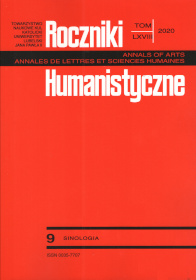Beyond East and West: What ‘Ladder’ Did John Wu Use Towards This Goal? (Part One)
Abstrakt
„Poza Wschodem i Zachodem” – jakiej „drabiny” użył John Wu do osiągnięcia tego celu?
John Wu Jingxiong (1899-1986) był dyplomatą, uczonym i autorytetem w dziedzinie prawa międzynarodowego. Był także wybitnym chińskim katolikiem. Jego duchowa autobiografia Beyond East and West (1951) przypomina Wyznania św. Augustyna poprzez poruszający opis nawrócenia Johna Wu na katolicyzm w 1937 r. i jego wczesne lata jako katolika. Sam tytuł autobiografii Wu wskazuje na jego duchowy ideał, który pozwala ludziom wykraczać poza kulturowe osobliwości (czy to zachodnie, chińskie czy inne). John Wu znalazł mądrość w wielkich chińskich tradycjach, tj. w konfucjanizmie, daoizmie i buddyzmie, wskazując na ich uniwersalne prawdy, które ostatecznie pochodzą od Chrystusa i w nim się wypełniają. Autor tego artykułu szukał uniwersalnych cech Johna Wu, które wykraczają poza jakąkolwiek kulturę i które metaforycznie nazwał „drabiną”. Znalazł potrójną drabinę, tj. wiarę chrześcijańską, przyjaźń wraz ludzką i boską miłością i prawo naturalne.
Bibliografia
Gentile, Emilio. Politics as Religion. Princeton University Press, 2006.
Harris, Maxine. The Loss That Is Forever: The Lifelong Impact of the Early Death of a Mother or Father. Penguin Books, 1995.
Hathaway, Ronald F. Hierarchy and the Definition of Order in the Letters of Pseudo-Dionysius: A Study in the Form and Meaning of the Pseudo-Dionysian Writings. Nijhoff, 1969.
Healey, Charles J. Christian Spirituality: An Introduction to the Heritage. St. Paul’s Alba House Bookstore, 1999.
Keegan, Nicholas M. “From Chancery to Cloister: the Chinese Diplomat who became a Benedictine Monk.” Diplomacy & Statecraft. Routledge, part of the Taylor & Francis Group, vol. 10, no. 1, 1999, pp. 172-185.
Marcel, Gabriel. Homo Viator: Introduction to a Metaphysic of Hope. French original: 1945. Translated by Emma Craufurd. Harper & Row, 1962.
Raveis, Victoria H., Karolynn Siegel, and Daniel Karus. “Children’s Psychological Distress Following the Death of a Parent.” Journal of Youth and Adolescence, vol. 28, no. 2, 1999, pp. 165-180.
Thérèse of Lisieux. The Autobiography of Saint Therese of Lisieux: The Story of a Soul. Translated by John Beevers. Doubleday Religious Publishing Group, 1989.
Tillich, Paul. Dynamics of Faith. Harper & Row, 1957.
Tsakiridis, George. Evagrius Ponticus and Cognitive Science: A Look at Moral Evil and the Thoughts. Pickwick Publications, 2019.
Vetterling-Braggin, Mary (editor). “Femininity,” “Masculinity,” and “Androgyny”: A Modern Philosophical Discussion. Adams, 1982.
Welch, Patricia Bjaaland. Chinese Art: A Guide to Motifs and Visual Imagery. Tuttle Publishing, 2008.
Copyright (c) 2020 Roczniki Humanistyczne

Utwór dostępny jest na licencji Creative Commons Uznanie autorstwa – Użycie niekomercyjne – Bez utworów zależnych 4.0 Międzynarodowe.





